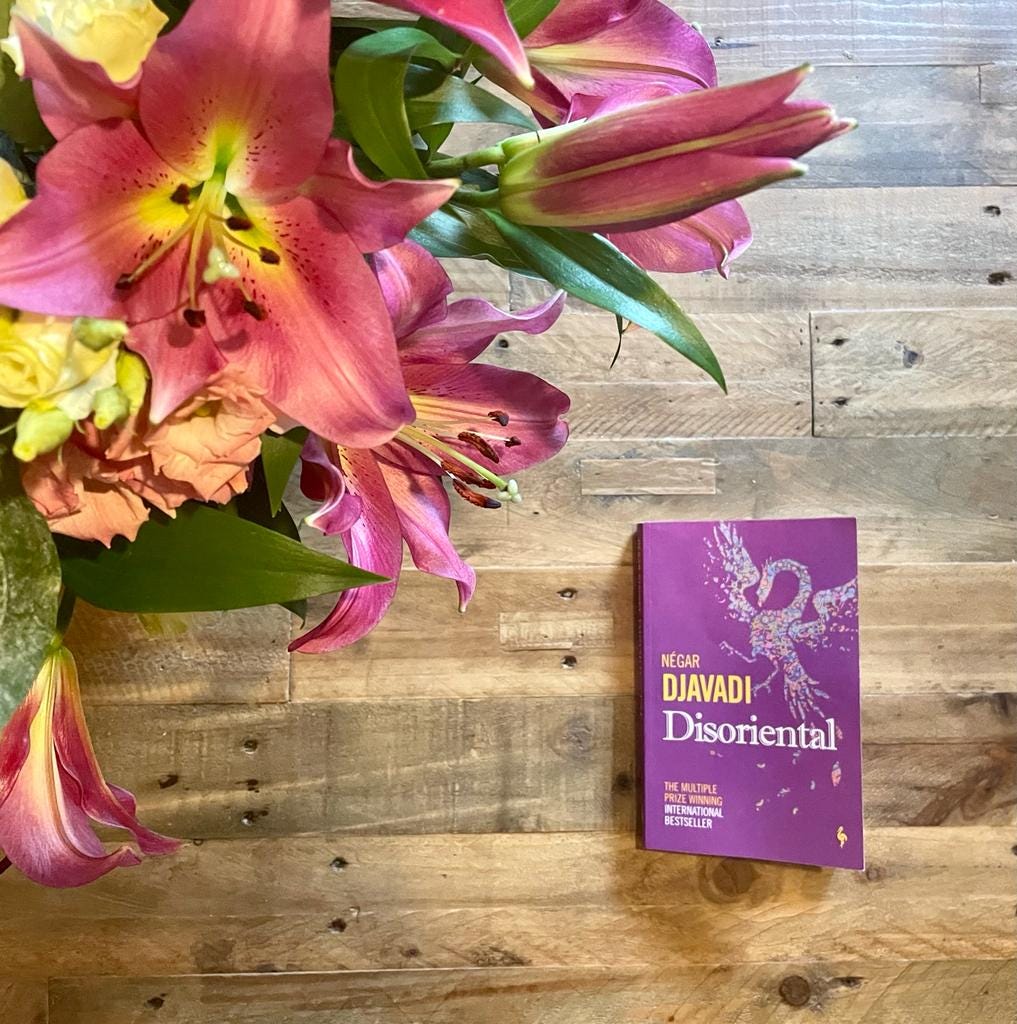Welcome to Bookmarked, a weekly newsletter following my journey as I read one book from every country. If you like the sound of my project, I’d love it if you shared Bookmarked with a friend.
Négar Djavadi’s Disoriental is an ambitious and multi-layered book about exile, identity, and social integration. Narrated in the first person by Kimiâ Sadr, the book jumps backwards and forwards between Kimiâ’s adult life in Paris and her childhood in Iran whilst also providing an account of Iranian history along the way.
Kimiâ is the daughter of Darius and Sara Sadr, two public intellectuals and political dissidents whose activism leads to threats against their lives and forces them to escape Iran. When Kimiâ is just ten-years-old, her family travel across the mountains of Kurdistan by horseback before settling in France. “They weren’t just a politically active intellectual couple,” says Kimiâ, “they were also a little bit Bonnie and Clyde.”
We meet Kimiâ in a fertility clinic in Paris. At this point in her life, she’s a twenty-five-year-old bisexual woman who is trying to get pregnant by means of artificial insemination. It is in this fertility clinic that Kimiâ’s mind wanders and she starts to recount her family history, from her great-grandfather Montazemolmolk’s harem of 52 wives in the early twentieth century to her father’s politics bringing him into conflict with both the Shah and Khamenei regimes in the years surrounding the Iranian Revolution. Stylistically reminiscent of a memoir, the book is punctuated with footnotes on Iranian history, politics, and culture, to “save you the trouble of looking it up on Wikipedia.”
Disoriental is divided into two sections: Side A and Side B. Side A is mostly set in Iran and centres around Kimiâ’s distant relationships with her parents, while Side B tracks Kimiâ’s coming of age in Europe and centres around her realisation that she is bisexual.
“… in our culture, the important thing is to be something; to fall into one category or another, and follow its rules. Transsexuality exists because there is something worse than being transsexual, and that’s being homosexual. That’s not shameful. Shameful is losing your virginity before marriage, or having an abortion, or staying an old maid and living with your parents until they die. Shameful is being a drug addict or having an affair or raising children who turn their backs on you. No, being gay isn’t shameful. It’s impossible. A non-reality.”
Disoriental spans a turbulent time in Iranian history and Djavadi paints a vivid portrait of what the loneliness of living in exile—without any semblance of a community—does to a person. At one point, Kimiâ comments that in order “to really integrate into a culture… you have to disintegrate first.”
I enjoyed Disoriental’s deliberate interweaving of past and present and I appreciated the way Kimiâ often breaks the fourth wall to address the reader directly. Djavadi’s characters are also extremely well realised. Nonetheless, at times I struggled with how much was going on in this book. In particular, some of the transitions between fictional scenes and historical footnotes felt a little awkward. Still, it’s an incredibly touching family saga that taught me a lot about a period of history I know very little about.
Disoriental by Négar Djavadi, translated by Tina Kover (Europa Editions, 2018 / Éditions Liana Levi, 2016)
More books by Iranian authors:
From the Devil, Learned and Burned by Farkhondeh Aghaei, tr. Mehran Taghvaipour
The Enlightenment of the Greengage Tree by Shokoofeh Azar, tr. Anon
Sauvashun: A Novel about Modern Iran by Simin Daneshvar, tr. M.R. Ghanoonparvar
I'll Be Strong for You by Nasim Marashi, tr. Poupeh Missaghi
Don’t Worry by Mahsa Mohebali, tr. Mariam Rahmani
Things We Left Unsaid by Zoya Pirzad, tr. Franklin Lewis
The Drowned by Moniro Ravanipour, tr. M. R. Ghanoonparvar
Being Forty by Nahid Tabatabaei, tr. Amir Marashi
Winter Sleep by Goli Taraghi, tr. Mohammad R. Ghanoonparvar
My Bird by Fariba Vafi, tr. Mahnaz Kousha and Nasrin Jewell
What have you read recently?
If you’ve read a brilliant book in translation or you’d like to pass on a recommendation, I’d love to hear about it! For this project, I’m focussing on contemporary fiction and short stories, with a preference for female authors—but I’m always happy to venture further afield for a good recommendation.
You can get in touch by replying to this email or leaving a comment. I’ll be featuring your recommendations in upcoming newsletters, and I’ll keep a growing list here.
Bookmarked is written by Tabatha Leggett. Thank you to May Ngo for her recommendation for this issue. If you know someone who would enjoy this newsletter, please forward it to them!





You might be interested in this book about Iran and the Kurds by an Australian author, Robert Brunton. It’s partially autobiographical, based on his experiences designing and building an exhibition in Tehran during the Shah’s rule, but connects with the story of a Kurdish family.
It’s called “Temple of the Magic Rats”:
https://www.amazon.com.au/Temple-Magic-Rats-Robert-Brunton-ebook/dp/B00A2IKBE0
Great review! I read this book and really enjoyed it, too. Definitely a book I think should be widely read.